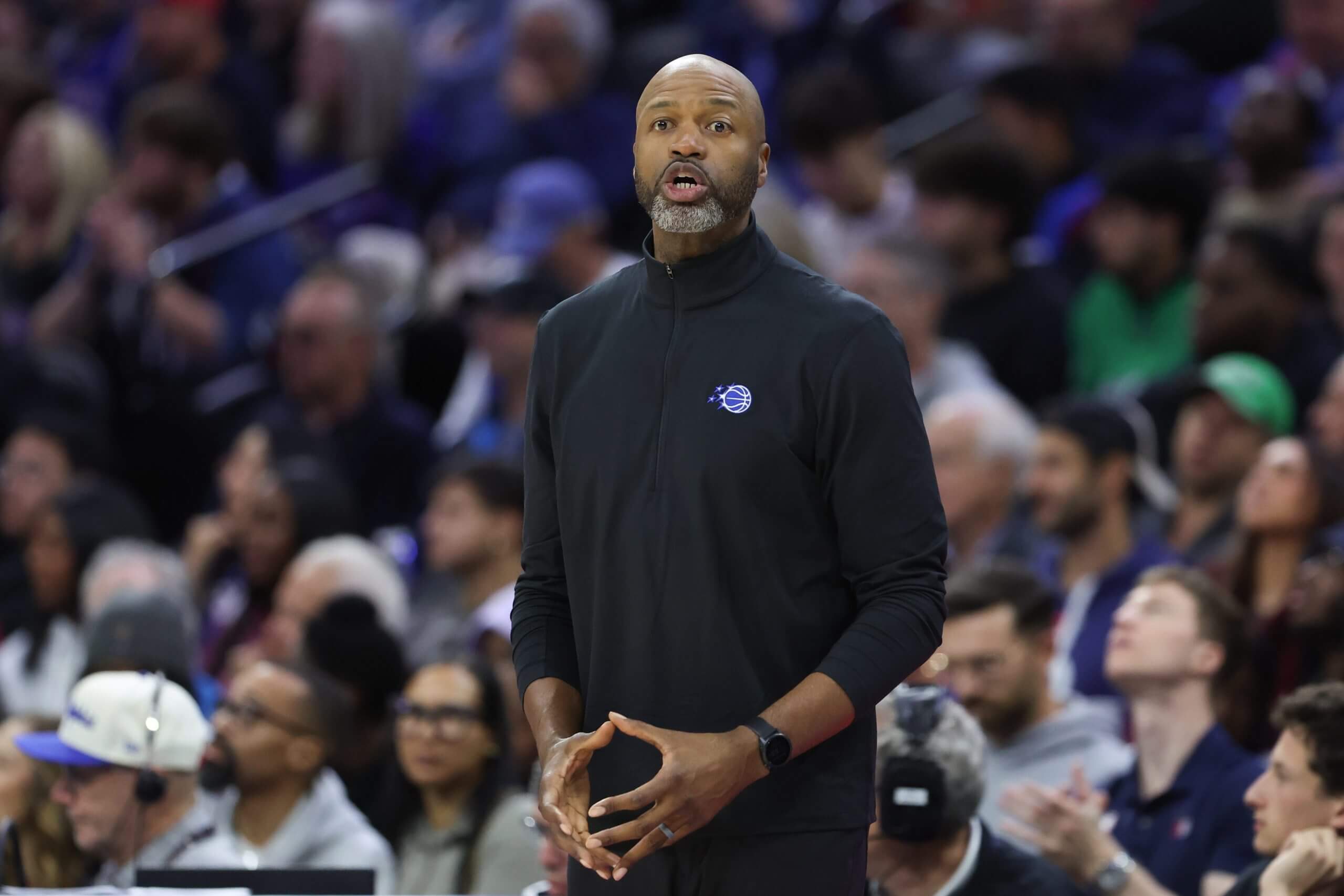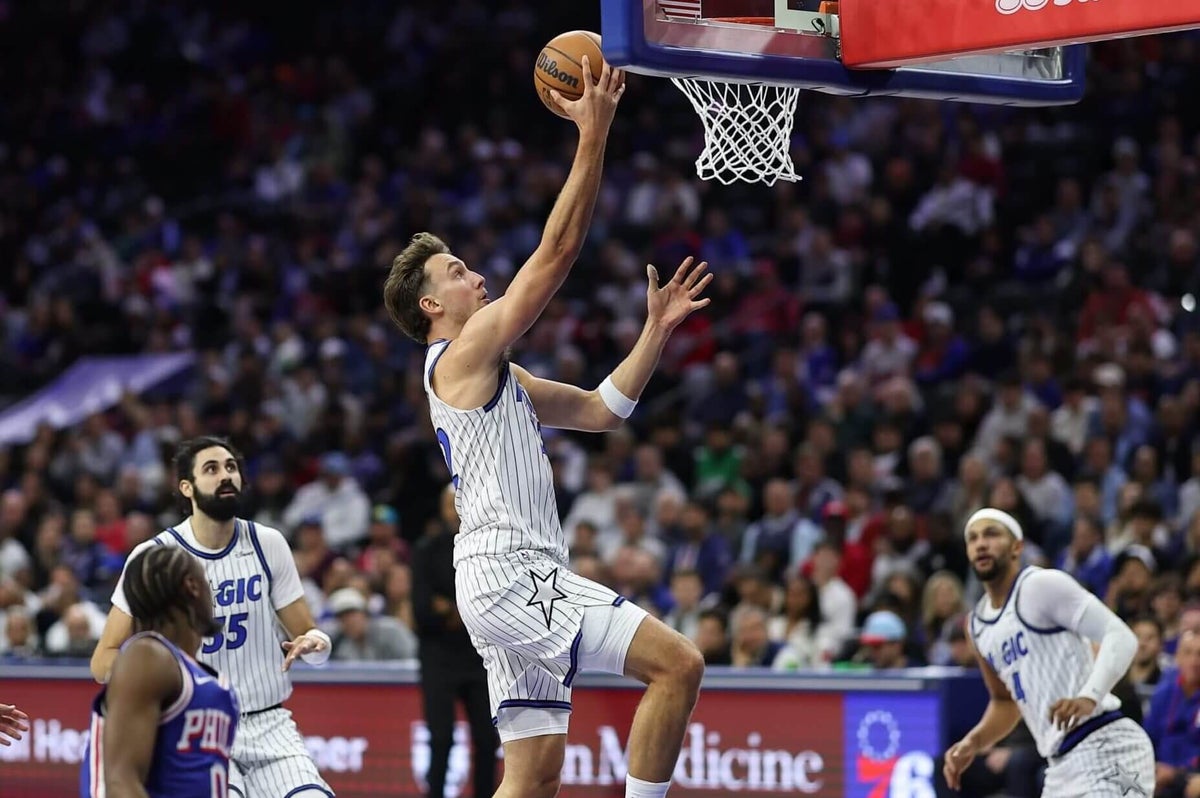PHILADELPHIA — These Orlando Magic, which have opened their season of high expectations in a slump, losing three of their four games so far, only marginally resemble the Magic teams that frustrated the NBA over the last few seasons.
Oh, there are significant similarities. Most of the nucleus remains, with Paolo Banchero, Franz Wagner, Jalen Suggs and Wendell Carter Jr. forming the team’s backbone as starters. The shooting still cannot yet be counted on to reach a league-average standard.
However, the way the club now plays — what people within and outside the organization would call an “identity” — differs in a way that’s plain to see.
The Jamahl Mosley-coached teams of 2023-24 and 2024-25 played at a glacial pace, grinding out victories with a tough defense and a deliberate offense punctuated by shot attempts late in the shot clock. Those Magic teams wore opponents down and beat them up. Playing against those Magic felt like a chore, like a miserable night at the office. The term “rock fight” comes to mind.
The 2025-26 Magic play fast, fast, fast — and they are doing so by design. They speed up the court on offense. They take a higher frequency of their attempts early in the shot clock.
And that can come at a price, especially for a team that’s not used to a quick pace.
“Playing fast, you’re going to give up some more points just because it speeds the game up and there’s more possessions,” Banchero said. “But I think we need to be smarter just about how fast we’re playing. I think if we’re just going fast without any direction, it’s not the best.
“I think direction is more important than speed. So, we can play fast, but if there’s no direction, then it’s going to be tough.”
Last season’s Magic averaged 96.5 possessions per game, the NBA’s slowest pace. This season’s Magic have averaged 104.9 possessions per game so far, the league’s eighth-fastest pace through Monday.
The heightened tempo is intended to jump-start Orlando’s offense, which last season ranked among the league’s most inefficient. Orlando finished last in 3-point makes and last in 3-point shooting percentage.
The Magic hope that playing fast will leverage their players’ inherent strengths (size, speed and strength) and minimize their most significant collective weakness (inaccurate shooting). The theory goes that putting Magic players into the open court against a moving defense, with the benefit of space and potential size mismatches, will generate easier, more efficient shots. A higher volume of shots also could help Magic players build a better rhythm.
However, the 1-3 start raises a fundamental question: Can the Magic play fast without losing the defense-first identity they had built?
“Yeah, I think so,” Suggs answered. “I think you can do both. Not only does your conditioning have to be elite, but it takes the same intention. A lot of our conversations, a lot of what we’re talking about, still preach defense. It’s still there, it’s known.
“But a lot of what we’re talking about and trying to put emphasis on is getting out, playing fast, getting good looks, crashing (the offensive boards) … It just takes being very detailed and a concerted effort to then get back on defense after all that and sit down and get stops.”
It is too early to know whether it will work, even though it looks clean in theory. The sample size is too small to draw definitive conclusions. Can Orlando’s offense improve without a concurrent decline in defense?
“I think it’s definitely a challenge, and I think that’s what you’re seeing right now, that we’re struggling with that a little bit,” Wagner said. “But overall, I like how we’re playing. At the end of the day, you’ve got to find easy ways to score. I think we’ll find a way to do both.”
Other factors complicate any analysis. Suggs returned only recently from knee surgery, and team officials will increase his minutes carefully. In the meantime, he has months’ worth of rust to knock off, and his teammates miss his point-of-attack defense.
The team also is blending in two new key players, swingman Desmond Bane and reserve point guard Tyus Jones, and the newcomers and incumbents require time to learn each other’s tendencies.
As if all of that isn’t enough, big man Moe Wagner continues to recover from ACL surgery, depriving the team of one of its best scorers off the bench and one of its best energy guys.

Jamahl Mosley’s Orlando Magic ranked second in the league in defensive efficiency last season. (Bill Streicher / Imagn Images)
No matter how well players get along off the court, comfort on the court does not develop overnight. Players and coaches must discover where and how the players will receive their most efficient shots.
The play-with-pace experiment has been a mixed bag.
Last season, the Magic scored 108.9 points per 100 possessions, finishing 27th in the league.
This season — and again, it’s ridiculously early — the Magic have scored only 108.1 points per 100 possessions, ranking 25th leaguewide through Monday. Mosley has noted, correctly, that the team’s offensive rating would be higher if it were making a higher percentage of its free throws and if it were committing fewer turnovers. The defense would be more efficient if it didn’t have to deal with the consequences of live-ball turnovers.
On Monday night in Philadelphia, the Magic progressed on offense — and also regressed defensively. They scored 126.5 points per 100 possessions, which would have been their fifth-most efficient offensive game last season. However, they also allowed 137.4 points per 100 possessions, which was their worst single-game defensive rating since Dec. 8, 2021, early in Mosley’s first season with the team.
Making matters worse: Orlando lost to Philadelphia 136-124, a loss that occurred even though Philly played without Joel Embiid, Paul George and Jared McCain.
The Magic often appeared content merely to trade baskets, a style of play that seemed very unlike the Magic. Still, the outcome might have been different if Orlando had not made only 26 of 38 free-throw attempts and had not committed 14 turnovers that led to 20 points.
It’s also possible that the loss in Philadelphia was a mere aberration. After the Magic’s first three games this season, they ranked sixth in defense.
“Anytime you add new (players), anytime you create a new style of play, there’s going to be an adjustment period,” Mosley said. “Unfortunately, we’ve been on the other side of it with the wins and losses, but there’s adjustments that will be made. There’s chemistry that will continue to grow with this group, and that’s what this group is. The resiliency that they possess will allow them to get this process a little bit faster together.”
These early-season games carry unusual importance, though. The Magic hope to earn home-court advantage in the first round of the playoffs. To accomplish that, they will need to finish in the top four of the Eastern Conference standings. These defeats endanger that goal.
The loss to the 76ers opened a road trip that also will include stops in Detroit, Charlotte, Washington and Atlanta. The Pistons and Hawks hope to secure home-court advantage in the first round, just like the Magic. Again, these games matter.
“Everything gets better with time, but, at the same time, we can’t just sit around and wait for it to happen,” Banchero said. “You know, this is a tough league. There’s a lot of good teams in this league. That (Sixers) team that just beat us had three of their best players out. You can’t just drop games and say that it’s going to get better with time. You have to act now and you’ve got to be better.
“I wouldn’t say that we’re being complacent. I think stuff needs to change, and we’ve got to be better.”

